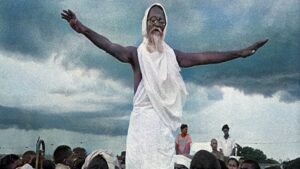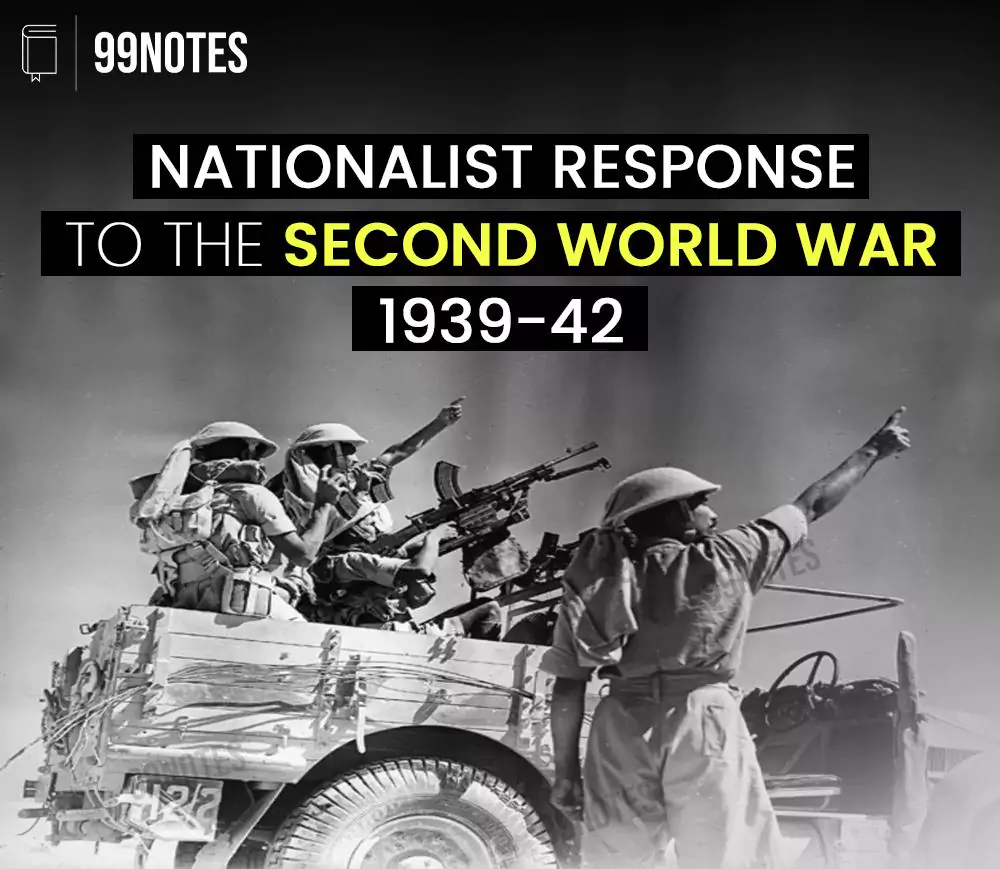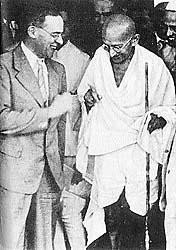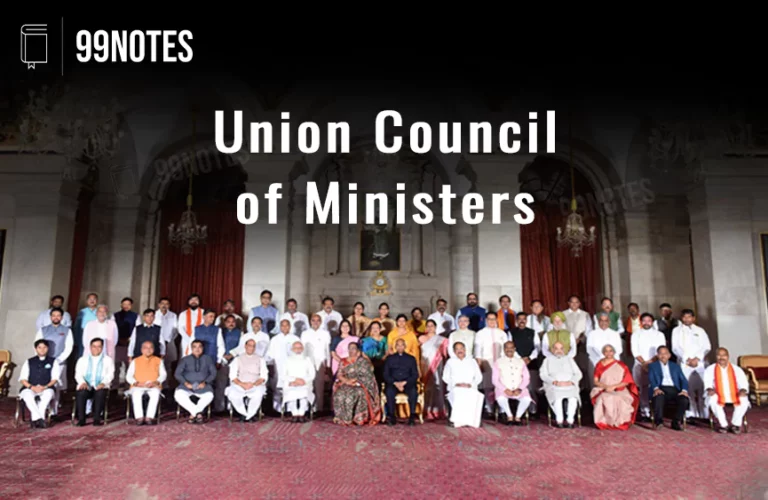NATIONALIST RESPONSE TO THE SECOND WORLD WAR (1939-42)
The Second World War
- The second world war broke out in September 1939 with the German invasion of Poland. Earlier, Germany had occupied Austria in 1938 and Czechoslovakia in 1939.
- Britain and France, which had been following a policy of appeasement towards Hitler, now came for Poland’s aid and declared war on Germany.
- The war was fought between two groups; the allied powers, which included Britain, France, Russia and the United States of America and the Axis powers, which included Germany, Italy and Japan.
- The British Indian government declared India’s support to the war without consulting with Congress or the central legislature.
Congress response and Wardha CWC meeting (September,1939)
- Congress, though unhappy with the government’s decision to unilaterally declare India’s support to the war, was sympathetic to the victims of the fascist aggressions.
- Its immediate reaction was to go to the aid of the anti-fascist alliance, provided a responsible government was established, and the future demands included a constituent assembly to frame the constitution of free India.
- Gandhi: Gandhi’s response was very emotional. He advocated unconditional cooperation with the British in their fight against fascist forces.
- Bose and other socialists: Subhash Chandra Bose, Acharya Narendra Dev and Jayaprakash Narayan, who were invited to attend the Wardha session, had no sympathy for either side of the war.
- They did not make a distinction between democracies and fascist forces and opined that both sides represented imperialism and were fighting for colonial possessions.
- They believed that the Congress should benefit from the situation and start the civil disobedience movement.
- Jawahar Lal Nehru: He took a unique position among all and sharply distinguished between democratic values and fascism.
- He believed in the just cause of Britain, France and Poland.
- However, he was clear in his position that Britain and France were imperial countries, and the war resulted from the inner contradictions of capitalism.
- Therefore, he argued that India should neither join the war till it is granted independence nor take advantage by starting an immediate struggle.
- CWC resolution: After Gandhi did not get support for his position, he decided to back Nehru’s position, which the Congress working committee then adopted.
- The resolution unequivocally condemned Nazism and Fascism, and the invasion of Poland. Still, it declared that India could not be a party to a war which was being fought for democratic freedom when India itself was denied freedom.
- If Britain is fighting the war for democracy and freedom, it should prove this in India.
- Britain should declare its war aims and how they would be implemented in India.
Government’s response and the resignation of the Congress ministries
- The government’s response was completely unfavourable. It tried to pit the Muslim League and the rulers of the princely states against the Congress and refused to specify Britain’s war aims beyond stating that Britain was just fending off aggression.
- As an immediate measure, the Viceroy Linlithgow offered to set up a consultative committee whose advice could be sought by the government whenever it felt necessary.
- The government promised that after the end of the war, it would enter into a consultation with communities, parties and interests in India and with the princely states regarding modifications in the Government of India Act 1935.
- It was clear that the government was not ready to either make any concessions immediately or make promises about the future. Instead, it tried to create difference among the Indians and branded the Congress as a purely Hindu organisation. The defence of India rules was promulgated to curb anti-government activities.
- The reaction of the Indian People: There was a sharp reaction from the Indians and the national leadership.
- The angriest reaction came from Gandhi: “The Indian declaration shows clearly that there is to be no democracy for India if Britain can prevent it”.
- On projecting the Congress as a Hindu organisation, Gandhi remarked, “The Congress will safeguard the rights of every minority so long they do not advance claims inconsistent with India’s independence”.
- The Congress working committee rejected the Viceroy’s statement as a reiteration of the old imperialist policy, decided not to support the war, and asked the provincial Congress ministries to resign in protest.
- However, the Congress leadership was still reluctant to give a call for an immediate and massive anti-imperialist struggle.
Debates on the Questions of immediate mass struggle
- After Viceroy Linlithgow’s statement, the debate started within the Congress on whether to launch a mass struggle.
- Gandhi and his supporters did not favour a mass struggle since they believed that the allied cause was just and the masses were not ready for a struggle.
- They were of the opinion that the Congress should instead focus on strengthening the organisation and continue negotiating with the government till all possibilities were exhausted; only then a mass struggle should be started.
- In a meeting in Allahabad in November 1939, the CWC resolution reiterated the imperialist nature of the war. It demanded that India’s independence and its right to frame a constitution should be recognised.
- In 1940, in the Rampur session of the Congress under Maulana Azad, while there was agreement that a struggle should be waged, there was no consensus on the form of struggle. The matter was left to Gandhi to decide the form and timing of the struggle.
Pakistan Resolution (1940) |
In March 1940, in its Lahore session, the Muslim league passed a resolution demanding:
|
- Even at this juncture, Gandhi favoured cooperation with the British. However, Nehru made it clear that complete independence must be the precondition for the Congress’s support of the British war effort. Bose was firm on his stand of taking advantage of the British situation.
- Finally, the Congress decided it would accept nothing short of complete independence and launch a civil disobedience movement as and when circumstances allow.
August Offer
Background
- The international political situation changed drastically in mid-1940; the defeat of France, Belgium and Holland against Germany put the British in a conciliatory mood.
- However, Both Nehru and Gandhi were strongly opposed to taking advantage of the situation.
- The Congress was ready for a compromise provided it got to form an interim government during the war period, but the government was not interested.
The offer
- The government came up with its own offer in order to achieve Indian cooperation in the war. In August 1940, Viceroy Linlithgow announced the August offer, which proposed:
- Expansion of the executive council to include more Indians.
- Dominion status for India at an appropriate time after the war.
- Introduction of a constituent body to frame a new constitution after the war.
- The proposal encouraged the Muslim separatists by stating that the future constitution would not be adopted without the consent of the minorities.
Responses
- In its meeting at Wardha in August 1940, the Congress working committee rejected the offer and asserted the demand for complete independence. Nehru observed that the “Dominion state concept is dead as a doornail”.
- The Muslim League, which was now beginning to demand a separate state, rejected the proposal.
Significance
- For the first time, dominion status was explicitly offered, and the rights of Indians to frame their constitution were also recognised.
- In July 1941, the executive council of the Viceroy was expanded to provide Indians with a majority of 8 out of the 12. However, crucial matters like defence, home and finance were still in British hands.
- National Defence Council was also established to include Indian non-official opinion in war efforts.
Individual Satyagraha
Background
- The government refused to consider the Congress’ proposal that it would cooperate in war efforts, provided it was allowed to form an interim government.
- The government also put forth a condition that no constitutional advances could be made until the Congress reached an agreement with the Muslim communalists.
- It also kept issuing ordinances, curbing the right to speech and the right to form associations.
The Satyagraha
- By the end of 1940, the Congress asked Gandhi again to take the lead.
- Gandhi decided to start a limited non-aggressive Satyagraha on an individual basis by only selected Congress members.
- The movement was essentially based on the principle of freedom of speech.
- The aims of the movement were:

- To show that the patience shown by the Indians is not due to their weakness.
- To express the anti-war position of the Indians.
- To provide another opportunity to the government to accept the demands made by the Congress and not embarrass the government’s war efforts by launching a mass struggle.
- During the Satyagraha, the Satyagrahi would inform the authorities of the time and place where he/she would make an anti-war speech. If the authorities did not arrest the Satyagrahi, he/she would repeat it and move towards Delhi; this came to be known as the ‘Delhi Chalo’
- Vinoba Bhave was the first to offer individual Satyagraha, followed by Jawahar Lal Nehru.
- By May 1941, more than 25,000 Satyagrahis had been convicted for offering individual Satyagraha.
The Cripps Mission
In March 1942, a mission under Stafford Cripps was sent to India by the Churchill government to seek the active cooperation of the Indians in the war. Cripps was a leftist Labourite who had supported Indian independence earlier.
Background
- Atlantic Charter: The charter was signed between the USA and Britain in August 1941 to set out Anglo-American goals for the world after the end of the war. The key objectives of the charter were:
- No territorial expansion.
- No territorial change against the wishes of the people (self-determination).
- The restoration of self-government to those who had been deprived of it.
- Global cooperation to ensure improved social and economic circumstances for everyone.
- As the situation in Europe worsened, US President Roosevelt and Chinese President Chiang Kai-Shek of China and the Labour Party in Britain pressured Prime minister Winston Churchill to seek active cooperation from the Indians.
The Proposal
- Even though Cripps made some encouraging announcements like the “earliest realisation of self-government in India” and “India’s right to secede from the Commonwealth in future”, the proposals of the missions turned out to be disappointing for the Indians.
- The mission proposed dominion status for India after the war.
- A constitution-making body would be constituted after the war whose members would be elected by the provincial assemblies, and in the case of the princely states, the members would be nominated by the rulers.
- The provision accommodated the demand of the Muslim League that if any province did not accept the new constitution, it would be able to sign a separate agreement with the British.
- For the present, India’s defence would remain in the hands of the British.
Responses to the proposals of the mission
- The Congress: The Congress was unsatisfied with the proposals, and negotiations broke down. Gandhi described the proposals as “a post-dated cheque”. The key objections of the Congress were:
- The provision of dominion status rather than complete independence.
- The representation of princely states by nominees of the ruler and not by the elected representatives.
- The right of the provinces not to join the constitution-making body.
- No plan for immediate power sharing, particularly regarding India’s defence.
- The Muslim League: The League criticised the concept of a single Indian union. It also did not like the absence of Muslim’s right to self-determination and no conspicuous provision towards the demand of Pakistan.
- The liberals saw the provisions against the unity and security of India, and the Hindu Mahasabha, also criticised the provision of the right to secede.
- The Sikhs were worried about the future of Punjab in case of partition.
Evaluation of the Mission
- The mission primarily failed due to the Cripps’ inability to bargain and negotiate. He was told not to go beyond the draft proposals. Moreover, his efforts to accommodate Indian onions were being sabotaged by Churchill, the secretary of state and the Viceroy.
- However, the mission was significant due to the following reasons:
- Unlike the August offer, the constitution-making was proposed to be solely in the hands of Indians.
- The mission provided a concrete plan for the constituent assembly, particularly regarding its membership.
- The right to secede from the Union gave the blueprint of partition for the first time.
- After achieving dominion status, India could withdraw from the Commonwealth.
- In the interim period, Indians’ involvement in administration was expanded.




![Post Mauryan Period: Shunga, Kanva Dynasties &Amp; More [Upsc Notes] | Updated July 9, 2025 Post Mauryan Period: Shunga, Kanva Dynasties & More [Upsc Notes]](https://www.99notes.in/wp-content/uploads/2023/04/post-mauryan-age-99notes-upsc-1-768x495.webp)


